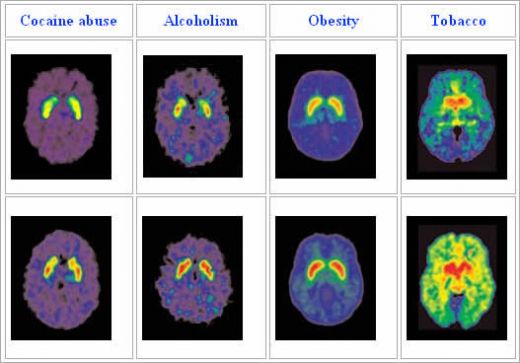According to BBC News this week, the brains of some people “may be wired for addiction.” A study has come out in the journal Science that presents evidence of abnormal brain structures that were found in drug addicts and their non-addicted siblings. The lead researcher, Dr Karen Ersche, was quoted by the BBC as saying that the study “shows that drug addiction is not a choice of lifestyle, it is a disorder of the brain and we need to recognize this.”
Has the Ersche et al study in fact shown that drug addiction is not a lifestyle choice? Has it proven that drug addicts should be treated as innocent patients with medical problems rather than being subject to moral censure for their failure to exert self-control, and for their irresponsible and often deeply anti-social behaviour? No! In fact, it is likely that no possible neuroscientific evidence could show such a thing.

To see why, we should first turn to the official version of the study’s findings, as explained in the Science paper itself. The authors wrote that the findings “support the idea of an underlying neurocognitive endophenotype for stimulant drug addiction.” Translation: the evidence suggests that drug addicts tend to inherit differences in their brains that are associated with addiction.
So how did the study work? The researchers first presented three groups: addicts, their non-addicted siblings, and non-addicted control subjects, with a standard inhibitory control test. They timed how long it took subjects to suppress an ongoing response they had been asked to make, after an auditory stop signal was given. They found that addicts and their siblings took longer than normal, suggesting that poor inhibitory control was inherited, rather than a result of their drug abuse. The scientists then investigated the relationship between inhibitory control and brain structures, and discovered that both drug addicts and their siblings had differences from the norm in the volume and organization of various bits of their brain tissues.
These findings sound impressive, especially when they have not been translated into plain English. But in fact they show almost nothing about the nature of the choices that drug addicts make, or do not make. What they suggest is that inherited traits (or traits produced by early environments, which siblings also typically share) contribute to addiction, which is completely unsurprising. They fail to show that the traits cause addiction. They also fail to show that the relevant traits constitute any kind of disorder in the brain.
Suppose someone sent Science a study purporting to show that abnormalities in the bodies of certain individuals caused them to become Olympic swimmers. Various “abnormalities” of the bodies of Olympic swimmers and their siblings compared to the average could doubtless be established: greater height, broader shoulders, more fast muscle fibres, a certain type of fat distribution, and so on. But of course there are inherited factors in whether one is likely to become an Olympic swimmer: indicating what they are shows exactly nothing about whether Olympic swimming is a choice or not. Nor does it show that there exists an “Olympic swimmer disorder” in the bodies of Olympic swimmers, or “non-Olympic swimmer disorder” in (most of) the rest of us. This imagined study of Olympic swimmers would be laughed directly into the editor’s waste paper basket.
Why are we, then, so easily bewitched and befuddled by neuroscientific studies that establish just about as much, and just about as little?

Very Interesting article. Thanks!
Comments are closed.